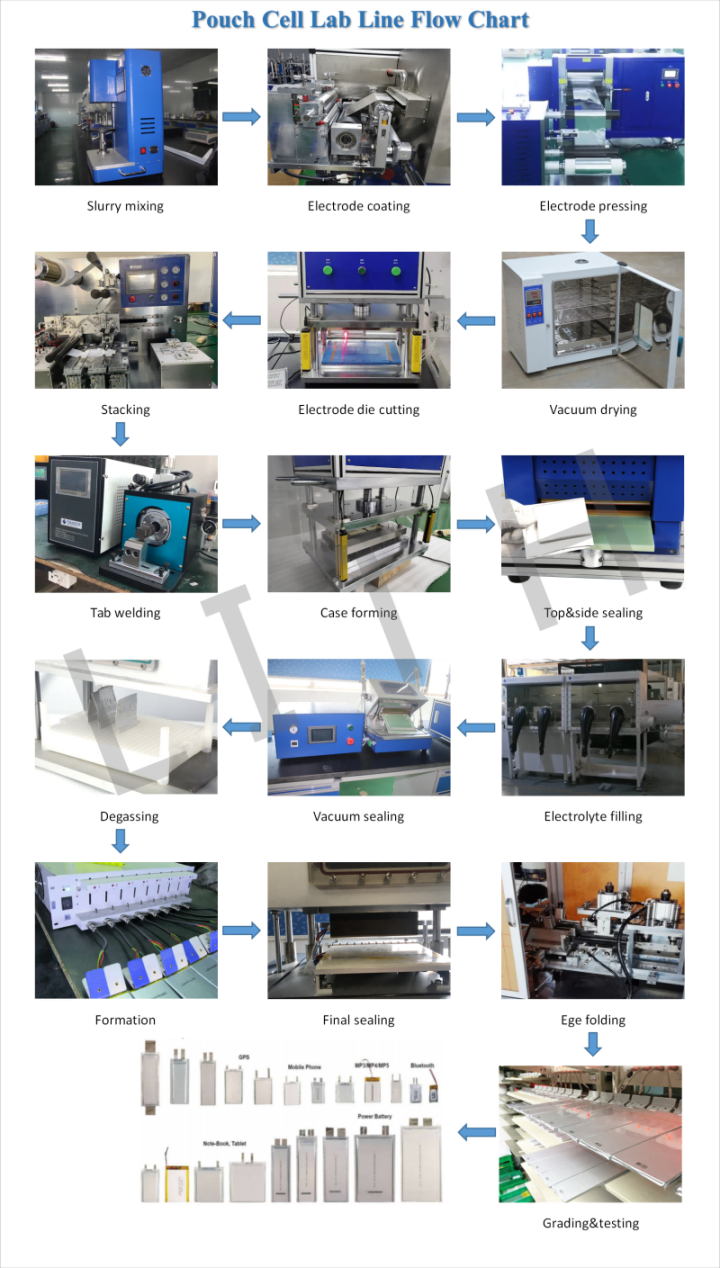A Pouch Cell pilot Plant is a specialized laboratory setup designed for the research, development, and small-scale production of pouch-type lithium-ion batteries. Pouch cells are a popular choice for portable electronic devices and are increasingly used in electric vehicles and energy storage systems. Here are the key components and functions of a pouch cell scale plant:
Components:
Electrode Coating Machine: This machine is used to coat the electrode materials (anode and cathode) onto thin metal foils. It ensures uniform and precise coating to optimize battery performance.
Electrode Cutting Machine: After coating, the electrode materials need to be cut into specific shapes and sizes to fit the pouch cell configuration. The cutting machine performs this task accurately.
Electrolyte Dispensing System: Pouch cells require the precise filling of electrolyte solution. The dispensing system ensures that the correct amount of electrolyte is added to each cell.
Pouch Cell Assembly Machine: This machine assembles the pouch cell components, including the coated electrodes, separator, and current collectors, into a sealed pouch format. It creates a tight seal to prevent electrolyte leakage.
Sealing and Crimping Machine: Pouch cells need to be sealed to maintain their integrity. This machine seals the pouch cell and crimps the edges to ensure a secure closure.
Formation and Testing Equipment: Formation equipment is used to condition the cells by performing initial charge and discharge cycles to stabilize their performance. Testing equipment allows for the characterization of the cell's capacity, voltage, impedance, and other parameters.
Safety Equipment: Safety measures are essential when working with lithium-ion batteries. Lab plants may include safety features such as fire suppression systems, fume hoods, and emergency shutdown controls.
Functions:
Research and Development: Pouch cell lab plant are used for R&D activities, enabling researchers to experiment with different materials, electrode designs, and manufacturing processes to improve battery performance and safety.
Prototype Production: Lab plants can produce small quantities of pouch cells for prototype testing and evaluation. This is crucial for assessing the viability of new battery designs.
Quality Control: Lab plants allow for quality control testing, ensuring that pouch cells meet specific performance and safety standards.
Education and Training: They serve as educational tools for training students, engineers, and researchers in battery technology and manufacturing.
Small-Scale Production: In some cases, lab plants may be used for small-scale production of pouch cells for niche or specialized applications.
Pouch cell lab plants play a critical role in advancing lithium-ion battery technology by facilitating research, development, and quality control. They are essential for optimizing battery designs, testing new materials, and ensuring the reliability and safety of pouch-type lithium-ion batteries.





 Online service
Online service +86 13174506016
+86 13174506016
